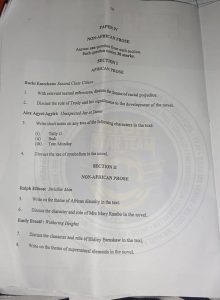Warning: Trying to access array offset on value of type bool in /home/delightedexpocom/public_html/wp-content/themes/mh-magazine-lite/includes/mh-custom-functions.php on line 144
Warning: Attempt to read property "post_title" on null in /home/delightedexpocom/public_html/wp-content/themes/mh-magazine-lite/includes/mh-custom-functions.php on line 144
NECO LITERATURE-OBJ
01-10 EADEDDDEEA
11-20 BACCAEBACB
21-30 BAAEDECDCB
31-40 CEDEEDEADB
41-50 BADACCACAA
COMPLETED ✅
NECO GCE LITERATURE PROSE
Question

(1)
Second-Class Citizen depicts ordinary Africans who are naturally blacks, and explores, how the fact of their race inhibits them from enjoying a glorious stay in a foreign land. The title of the novel “Second Class Citizen refers to a substandard, inferior, and black citizen in the novel, the fact that there are second-class citizens and first-class citizens makes racism and identity crisis evident in the novel. The former is associated with the British people, who stand the chance of becoming a partaker of everything the society offers, while the latter which is black (Africans to be precise) have their choices limited. They are not allowed to live with their white counterparts, which is a white dominant community. The blacks are forced to live in slums, while menial jobs are meant for them.
For example, Adah and her family make the theme of racial discrimination and prejudice prominent in the novel as an issue that she tries to avoid all to no avail. Adah’s first encounter with race relations occurs when they are still at Ashdown Street, when she is served a notice to quit the house. It reads “No meandering A solicitor representing their landlord, would like them to quit and give up all claims to the tenancy of their one room. This is not because she had a problem with her fellow tenants or the landlady, as she has done everything to avoid any clash or confrontation with them. Some of the things working against her and the family include: They are blacks. Nigerian to be precise.
Adah has refused to send her children to nursery like everyone else in England. Also, they are Ibos, the hated people because they believe in their own ideologies. The landlady is aware that Adah is expecting a third child and the fact that Vicky has cheated death “Adah is expecting a third child and the fact that Vicky has cheated death “Adah and her husband must go” the landlady affirms. Their search for a new accommodation yields no result. Nearly all the vacant spaces they come across bear an inscription. “Sorry, No colored” no them.
Adah’s house hunting is made more difficult because of racism and identity crisis, for she is black, with two children, and pregnant with another. Race relation has taught her a lesson that her color is something she should be ashamed of. She was never aware of this at home in Nigeria, even when in the midst of whites. As racism is beginning to have a serious psychological effect on her, she vows never to measure up with the white folks-but to live a low lifestyle, and also stop looking for accommodation in a clean, desirable neighborhood. She is now learning to suspect anything beautiful and pure because those things are for the white, not the blacks.
Also, the effect of racial discrimination has made Adah a liar and deceiver such that she had to change her Nigerian-born accent so as to sound like a white lady in order to secure accommodation. Both Adah and Francis still have to visit the white landlady to conceal their black colors and identify without result. It is also the effect of racism that makes Francis burns the manuscript of Adah’s first novel. The Bride Price because he feels that Adah is black, and the writing career is meant for the white alone.
(2)
Trudy is a British woman who is a child daily minders. She is introduced to Adah by Babalola, her own compatriot.
Her job is to dress children and take care of them before their parents call for them. She is clean and well dressed and very friendly outwardly, but a dirty woman to the core. Her house, like all the houses in that area, is a slum-a house that has been condemned ages ago. The back yard is filled with rubbish, broken furniture, and very near an uncovered dustbin is a toilet.
The novel delves into the cultural clashes that arise as Adah, originally from Nigeria, navigates her life in the United Kingdom. Trudy, as a representation of Western societal norms, clashes with Adah’s cultural background, creating tension and highlighting the challenges faced by immigrants in adapting to a new cultural context
Trudy’s character becomes a catalyst for Adah’s quest for independence and empowerment. Adah’s experiences with Trudy prompt her to question traditional gender roles and societal expectations. Adah’s determination to break free from the constraints imposed by Trudy becomes a driving force in her journey toward self-actualization.
Adah decides to visit her children one day unannounced and she meets her two children in the refuse dump area. Vicky is busy pulling rubbish out of the bin and Titi is washing her hands and face with the water leaking from the toilet. A few days later, Vicky fells sick and he’s diagnosed with a virus called meningitis. The chance of his survival is very slim. When confronted to inquire about the outcome of the disease. She lies about it, and the council removes her name from the list of approved child-minders. Trudy therefore, is also a cheat, a liar, and her personality a sort of vulgarity.
Leave a Reply